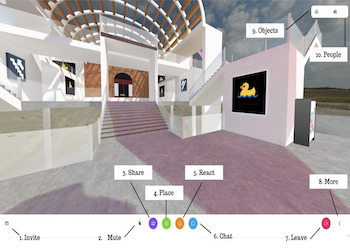UC5 - Control Room in Metaverse
The purpose of this use case is to employ Extended Reality (XR), Metaverse, Digital Twin, and IoT technologies for remote, multi-agency, and environment-tailored XR training and real-time visualization of behavioral anomalies/ movement patterns. UC5 enhances the management of large events and situations of panic by contributing to improved decision-making and reduced intervention times in the event of an emergency on the side of emergency responders. The target environment is the events area at Valentino Park.
Trial
The first trial of the TrialsNet project has been successfully conducted in Turin on 15th October 2024. In particular, the trial focused on Use Case 5 “Control Room in the Metaverse”, which targets the enhancement of the safety and security forces’ operations through the development of a web-based application. A key feature of the UC5 is the creation of a collaborative Metaverse Control Room (MCR) that can be accessed from any location using a security code using VR headsets and/or tablets. Inside the MCR the various officers can coordinate between them and receive real-time information from the location of the accident. The use case also aimed to evaluate the capability of the current deployment of the public 5G network in supporting this innovative application.
The trial saw the participation of eighteen officers from five security agencies in Turin, including 112 (emergency switchboard), 118 (ambulances), police, fire brigade, and civil protection. During the trial, a simulated emergency situation in the Park of Valentino was enacted. This was preceded by an introduction and training session at the Talent Garden building nearby. Subsequently, participants reconvened at the Talent Garden to provide feedback through evaluation forms. Trialsnet partners involved in the trial were Crossmedia Europe (developer), TIM (operator), Nextworks (architecture), CNIT (sensors), and the Municipality of Turin as coordinator.
The trial showed lower-than-expected uplink/downlink loads, as agents preferred audio over video due to standard operation procedures and tablet discomfort. Future bodycam use may increase data loads. The app and system performed well but scaled only for small-to-moderate groups, risking performance issues with more users. Network reliability (below 95%) raised concerns about security use. 76% of agents found the app improved inter-agency communication and intervention efficiency and would agree to use it.
The upcoming phases of the use case will involve a thorough examination of the findings, enhancements to the application, and communication and dissemination efforts to effectively share the project’s outcomes.

A video of the trial is available here.